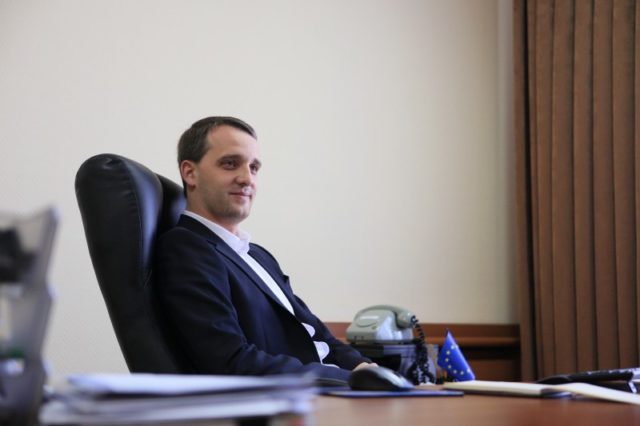
New Pro-Western Moldovan Defense Minister Faces Uphill Battle
Publication: Eurasia Daily Monitor Volume: 14 Issue: 148
By:

On October 24, Eugen Sturza was sworn in as Moldova’s minister of defense by Parliament Speaker Andrian Candu. This put an end to an eleven-month-long battle over the appointment between pro-Russian President Igor Dodon and the nominally pro-Western government, controlled by Vlad Plahotniuc. After Dodon repeatedly refused to appoint Sturza, citing the nominee’s lack of experience in the defense sector and his questionable integrity, the Constitutional Court had to step in. The Court sided with the government, temporarily relieving the president of his constitutional prerogative of appointing ministers. The ruling is yet another controversial decision by the high Court that undermines the few remaining checks and balances in the Moldovan political system (see EDM, October 24). With his legitimacy being questioned, the new Defense Minister Sturza is likely to face significant challenges in spearheading his new vision for the Moldovan defense sector.
Moldova faces a number of major security threats. The frozen conflict with the separatist region of Transnistria and the presence of Russian troops and munitions in the breakaway area pose a continuous threat to Moldova’s sovereignty and national security. Moreover the ongoing conflict in eastern Ukraine and the Russian annexation of Crimea also carry major risks for Moldova. At the same time, Moldova remains highly vulnerable to “hybrid” (“new type”) threats in terms of energy, informational and cyber security. In recent years, there has been increased awareness domestically about the need to boost the country’s defense capabilities; but to date, little has been done. With about 6,500 active-duty military personnel, the Moldovan army remains smaller and considerably undertrained and underequipped compared to the 7,500-strong Moscow-backed Transnistrian force, not including the roughly 1,600 regular Russian troops stationed in the region (Deutsche Welle, April 20, 2015; (Russiancouncil.ru, accessed November 16, 2017; see EDM, July 31).
Despite being consistently rated the second-most-trusted institution in the country, following only the Church (Iri.org, November 8), the Moldovan Armed Forces remain underfunded and the country’s defense budget has been by far the lowest in the region, stagnant at 0.3 percent of GDP. Only since 2015 has there been an actual increase in defense spending (Agora, May 16, 2015; Moldnova.eu, July 15, 2016). Nonetheless, despite incremental growth in absolute terms, relative to GDP the 2017 defense budget was actually slightly lower compared to the year before—0.4 percent versus 0.42 percent of GDP, respectively (Mf.gov.md, 2017, accessed November 16). These figures underscore the lack of a genuine commitment by the government to significantly boost the country’s defense capabilities. Instead, Chisinau continues to rely heavily on foreign assistance, which, though indispensable, is not a sustainable way to assure national security (Moldova.org, August 12). The United States government has been a major contributor to the modernization of the Moldovan military infrastructure, causing the ire of pro-Russian President Dodon, who is highly critical of the west in general and the US and the North Atlantic Treaty Organization (NATO) in particular (Noi.md, August 14). Illustratively, the opening of the NATO Liaison Office in Chisinau has already been delayed by nearly a year due to the Moldovan president’s opposition and the government’s lack of political will (Ziarulnational, September 14). The absence of agreement between the president and the new defense minister regarding the national security agenda is likely to cause further tension going ahead.
The differences in viewpoints between the commander-in-chief and the defense minister could hardly be starker. Eugen Struza, who is also the vice president of the government’s junior coalition partner—the European People’s Party of Moldova (PPEM), led by former prime minister Iurie Leanca—promotes a manifestly pro-Western agenda. Sturza is making a political point by having announced that his first visit abroad will be to the NATO headquarters in Brussels, while the second one will be to Bucharest (Europalibera.org, November 7). Shortly after his appointment, Sturza had a phone conversation with his Romanian counterpart and met with the Romanian ambassador to Chisinau days later to discuss bilateral defense cooperation (Army.md, November 2, 9). On Tuesday, Minister Sturza met with US Ambassador James Pettit and laid down his plan for reforming Moldova’s defense sector by focusing on updating a set of strategic documents (Army.md, November 14). Moldova’s draft National Security Strategy, developed under the previous head of state, Nicolae Timofti, was nixed by President Dodon. Nonetheless, on November 1, the government approved the National Defense Strategy with no input from the president (Gov.md, November 1), and the Military Strategy is pending approval. Thus, president Dodon is being excluded from the defense sector policymaking process (Timpul, November 7).
Yet, it is important to note that the legitimacy of the new defense minister (see EDM, October 24) as well as of the entire government (see EDM, January 21, 2016) has been called into question due to recent political scandals and maneuvering by the country’s major political players and institutions. As a result, implementing a robust reform agenda will be an uphill battle for Sturza, especially if contested by the popularly elected commander-in-chief—President Dodon. With Moldova’s austere budget, a significant modernization of the armed forces in not in the cards for the time being. Furthermore, as the army is not a significant political constituency in Moldova, the defense sector will likely remain little more than a political prop for the political parties waging an already traditional geopolitical tug of war during the 2018 parliamentary campaign. If nothing else, the repeated postponement of the opening of the NATO Liaison Office in Chisinau is a vivid indication of the strictly rhetorical nature of many of the government’s pro-Western commitments. His lack of defense sector experience notwithstanding, the young civilian reform-minded new minister is expected to try to maintain the issue of the national army on the government’s agenda. However, given that he and his party are only a junior coalition partner to the ruling Democratic Party, most of the important decisions will almost certainly not be his to take.



